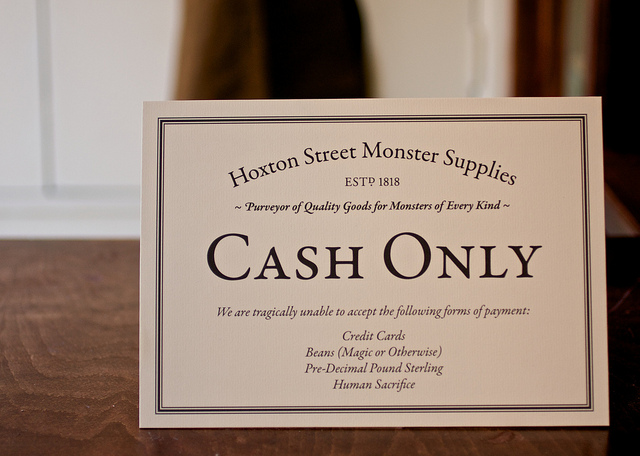 |
| ▲ Shop rejects the payment by credit card. |
The rejection of credit card for payment of goods and services is on the rise. Suppliers are insisting on cash only or face a 10% penalty for using cards for payment. This is particularly prevalent with online shopping malls such as Daum cafe and Naver blog. Dankook University (DKU) isn’t immune to this phenomenon. A local copy shop near the Cheonan campus demands an additional 10% from students paying with a card, while markets near the Jukjeon campus also require the same. This practice has led many consumers, including Dankookians, to feel inconvenienced using credit cards.
On the surface, the use of credit cards is more convenient than cash. When you do your year-end tax adjustment, the National Tax Service can get a firm grasp of your annual consumption for the fiscal year and can provide you with a tax credit according to your expenditure volume. When people buy products in cash, that purchase is not recorded in your total annual consumption.
So why do stores make it difficult for consumers to make payments by credit card? There are two reasons. First, when consumers pay for products using a credit card, the self-employed entrepreneurs have to pay a commission to the
credit card companies. Second, businesses may want to hide their real income from the National Tax Service in order to reduce their tax burden. If consumers pay by credit card, the purchases are recorded and therefore the numbers reported to the National Tax Service are more accurate.
The Dankook Herald (DKH) looked further into the experiences people had with payments by credit card. The DKH interviewed Jang Dong-seon (sophomore, Dept. of Physical Education). He said, “Sometimes I am refused payment by credit card. For instance, when I signed up for a Pilates lesson, the academy told me there was a 10% discount for cash payments.” He added, “I usually go to the cafeteria in the Business and Economics Hall. When I tried to purchase bread, which was less than 1,000 won, the owner rejected my card as a form of payment. I was told to pay by credit, I had to purchase more products.”
According to Korean law, the rejection of payment by credit card is illegal. The Specialized Credit Financial Business Act states sellers cannot refuse to accept credit cards or require higher prices because customers are paying with a card. If sellers attempt to enforce this policy, they are punishable under the law by a sentence of less than a year in prison or fine below 10 million won.
To better understand the economics of this situation, the DKH interviewed Prof. Je Jung-jo (Dept. of International Trade). First, the DKH asked who suffers the greatest loss when consumers use credit cards for small ticket items, the seller, the credit card company or the firms that run the payment management system. “When you make a small purchase using a credit card, the credit card company pays the greatest penalty. Credit card companies pay taxes to the nation, and a cost to the Value Added Network Company who installs and manages credit card readers in the shops. The credit card company only gets commission based on the total value of payments made by credit card. In other words, sellers suffer the least amount of damage from this kind of transaction because the amount of commission they pay is relative to their monthly total sales, not by the number of transactions they process.” he said.
It is clear that the rejection of payment by cards in order to hide income is an act which must prick the conscience of the business owners. Even if a small purchase payment by credit card disadvantages a store, there is no reason to shift that damage over to the customer. If a shop demands an additional 10% or simply rejects any payment by card, the customer will most assuredly suffer from an inconvenienced service, and will in the future avoid using that store. As a result, the seller will lose business and those shrinking sales will hinder their future growth. In other words, caution is required when choosing to alienate card-paying
customers.
허윤아, 이훈기, 장지원 dbsdk829@hanmail.net

![[Campus Magnifier] Let's Surf the Library!](/news/photo/202404/12496_1765_4143.jpg) [Campus Magnifier] Let's Surf the Library!
[Campus Magnifier] Let's Surf the Library!
![[Campus Magnifier] Let's Surf the Library!](/news/thumbnail/202404/12496_1765_4143_v150.jpg)





